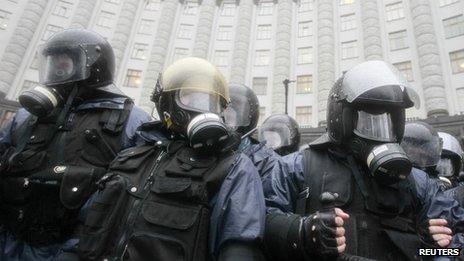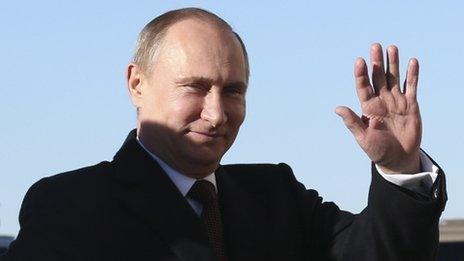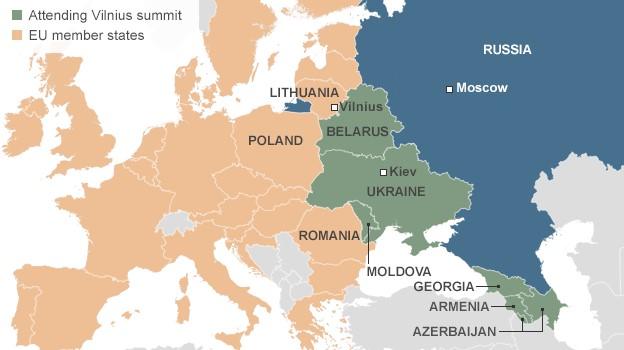EU-Russia rivalry looms over Vilnius summit
- Published
Ukraine deal overshadows EU talks
EU influence in the former Soviet Union is a sensitive issue and will be put to the test at an EU "Eastern Partnership" summit opening in Vilnius, Lithuania.
Ukraine froze a far-reaching co-operation deal with the EU last week, triggering mass pro-EU rallies in its cities. The BBC's Chris Morris examines the EU's geopolitical tussle with Russia.
They still stand watch at the Green Bridge over the Neris River in the centre of Vilnius.
Rusting iron statues from Soviet times in the style of Socialist Realism - Red Army soldiers, workers and farmers.
Some Lithuanians want the statues removed, but they are protected cultural items. Instead a plaque notes that 300,000 Lithuanians were exiled, imprisoned or killed during the Soviet occupation.
For EU member states in this region - the three Baltic republics and Poland in particular - there is a recent shared history.
That is one of the reasons why perceptions of Russian bullying are such a sensitive subject.
"This is all about geopolitics," says Romas Svedas of Vilnius University. "Let's not pretend otherwise. Russia is fighting to protect its dominance."
The EU's Eastern Partnership is designed to improve trade and political relations with six former Soviet Republics - Armenia, Azerbaijan, Belarus, Georgia, Moldova and Ukraine - caught in that awkward space between the European Union and Russia.
Ukraine is the biggest country and hence the biggest prize.

Kiev and other cities across Ukraine have seen mass pro-EU demonstrations
So when the Ukrainian government suddenly announced last week - under pressure from Moscow - that it was freezing its plans to sign an association agreement with the EU, the centrepiece of the Vilnius summit disappeared rather abruptly.
"But it's not just about Ukraine," argues the Lithuanian Foreign Minister Linas Linkevicius. "We will sign initial association agreements with Georgia and Moldova, we are making good progress in the visa discussions, all the countries are fully engaged.
"Of course I'm a little disappointed, but we will keep moving forward. And we still don't know how things will play themselves out," Mr Linkevicius says.
Tug-of-war
So could the EU have done more? One of the problems has been that many countries in western Europe have given a lower priority to the Eastern Partnership than they might have done.
And for the moment that appears to have given Russia, and its threats of trade retaliation, the upper hand.

The EU says Russia's President Putin is exerting undue pressure on Ukraine
"I think it's become quite a significant fault line," says Amanda Paul of the European Policy Centre in Brussels.
"This is a region that ultimately does want to be transformed, it wants to be part of Europe. But Russia is holding on with everything it's got.
"And it's very good at holding on with everything it's got, whereas the EU is not so good at pulling on the other end of the rope."
There has been reaction to the pressure from Russia - but it has come primarily from the people. There have been several days of large pro-EU protests in Ukraine.
So if there is a geopolitical battle going on, about whether economies and systems of government in this region should look east or west, some of those involved would like the EU to speak out rather more forcefully.
"It's not only enough to follow the norms in your own behaviour," says Nathalie Sebenadze, Georgia's ambassador to the EU. "You also have to speak out when you see that somebody else is violating them."
Russia's backyard
There is an immense amount at stake.
The association agreements within the Eastern Partnership are the most comprehensive ever offered by the EU to third countries.
There is no official perspective for future EU membership. But participating countries would agree over the long term to abide by more than two-thirds of the EU's rules and regulations - in effect extending large parts of the single market.
In a region that Russia still considers its own backyard, the government in Moscow does not approve.
The official line from the Vilnius summit will be that everyone can win - the EU, Russia and all the countries in-between.
But quite often it doesn't feel that way.

- Published10 December 2013
- Published27 November 2013
- Published26 November 2013
- Published26 November 2013
- Published26 November 2013